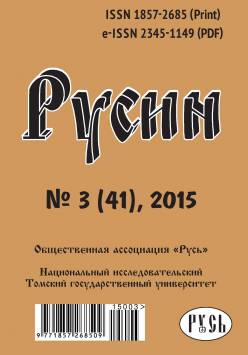The Concepts Envy and Jealousy in Yu. Olesha's Novel "Envy" and Its Translation into Polish
The processes of language categorisation associated with the designation of the concepts envy and jealousyin Slavic and Romance-Germanic languages are correlated with each other in a number of positions. Being derivative, emotive semantics is formed on the basis of the lexicon of intense physical action or visual perception. The logic of the development of the word semantics from the physical to the emotional sphere is universal for Indo-European languages. However, the language interpretation of such emotions as envy, jealousy and hatred represents different semantic configurations that demonstrate the speaker's perception of causal links between different emotional states. Russian and English have a special emotive word for each sense to distinguish the related emotions. On the contrary, in Polish and French jealousy and envy are represented by one word (jealousie, zazdrosdj. This article contains the analysis of the linguistic presentation of the artistic concepts envy and jealousy in the original and translation of the novel "Envy" by Yu. Olesha. The translation was a challenge as there is no complete lexical correspondence and syntactical parallelism in Russian and Polish to express emotional states. The translator's task was to convey the emotional states and qualitative characteristics of envious characters with the help of lexical and grammatical language tools. The author preferred verbal constructions to predicative adverbial constructions with the semantics of 'involuntary feelings', which is indicative of his intentions to explore the emotional world of the envious character responsible for feelings and attitudes towards others. This intention has been adequately translated, as the translator prefers metaphorical structures with such components as 'intensity', 'danger' 'all-embracing', following Olesha's plan to show the highest degree of emotion.
Keywords
художественная картина мира, языковая концептуализация эмоций, русский и польский языки, теория перевода, language picture of the world, linguistic conceptualisation of emotions, Russian and Polish, theory of translationAuthors
| Name | Organization | |
| Bulygina Elena Yu. | Novosibirsk State Pedagogical University | bulyginalena2010@mail.ru |
| Tripolskaya Tatiana A. | Novosibirsk State Pedagogical University | tatianatripolskaya@gmail.com |
| Ferenc Pavel | Novosibirsk State Pedagogical University | pawelferenc2@gmail.com |
References
_6_2017_1508079193.jpg)
The Concepts Envy and Jealousy in Yu. Olesha's Novel "Envy" and Its Translation into Polish | Rusin. 2017. № 2 (48). DOI: 10.17223/18572685/48/5
